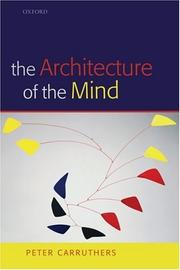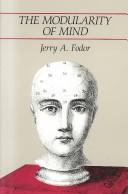| Listing 1 - 4 of 4 |
Sort by
|

ISBN: 0199207070 9780199207077 9780199207084 0199207089 0191708909 9786611149017 0191525812 1281149012 1435624750 Year: 2006 Publisher: Oxford Clarendon
Abstract | Keywords | Export | Availability | Bookmark
 Loading...
Loading...Choose an application
- Reference Manager
- EndNote
- RefWorks (Direct export to RefWorks)
Peter Carruthers, a leading philosopher of mind, provides a comprehensive development and defense of one of the guiding assumptions of evolutionary psychology: that the human mind is composed of a large number of semi-independent modules. Written with unusual clarity and directness, and surveying an extensive range of research in cognitive science, it will be essential reading for anyone with an interest in the nature and organization of the mind.
Cognitive psychology --- Philosophical anthropology --- Theory of knowledge --- Mental Processes. --- Brain --- Psychology --- Modularity (Psychology) --- Brain. --- Psychologie --- Modularité (Psychologie) --- Cerveau --- physiology. --- Philosophy. --- Philosophie --- Modularity (Psychology). --- Modularité (Psychologie) --- Faculty psychology --- Modules (Psychology) --- Human information processing --- Cerebrum --- Mind --- Central nervous system --- Head --- Philosophy

ISBN: 0521789087 0521783313 0511611927 Year: 2000 Publisher: Cambridge, U.K. ; New York : Cambridge University,
Abstract | Keywords | Export | Availability | Bookmark
 Loading...
Loading...Choose an application
- Reference Manager
- EndNote
- RefWorks (Direct export to RefWorks)
How did our minds evolve? Can evolutionary considerations illuminate the question of the basic architecture of the human mind? These are two of the main questions addressed in Evolution and the Human Mind by a distinguished interdisciplinary team of philosophers, psychologists, anthropologists and archaeologists. The essays focus especially on issues to do with modularity of mind, the evolution and significance of natural language, and the evolution of our capacity for meta-cognition (thought about thought), together with its implications for consciousness. The editors have provided an introduction that lays out the background to the questions which the essays address, and a consolidated bibliography that will be a valuable reference resource for all those interested in this area. The volume will be of great interest to all researchers and students interested in the evolution and nature of the mind.
Genetic psychology --- Modularity (Psychology) --- Metacognition --- Psycholinguistics --- Evolutionary psychology --- Psychologie génétique --- Modularité (Psychologie) --- Métacognition --- Psycholinguistique --- Psychologie évolutionniste. --- Congresses --- Congresses. --- Congrès --- Psychologie génétique --- Modularité (Psychologie) --- Métacognition --- Psychologie évolutionniste. --- Congrès --- Cerveau --- Langage --- Ontogenèse --- Phylogenèse --- Arts and Humanities --- Philosophy --- Meta knowledge --- Metamemory --- Cognition --- Self-control --- Self-perception --- Faculty psychology --- Modules (Psychology) --- Human information processing --- Human genetics --- Psychology --- Genetic psychology. --- Psychologie génétique. --- Modularité (psychologie)

ISBN: 0631161937 0631174559 Year: 1992 Volume: vol *4 Publisher: Oxford, UK New York, NY, USA Blackwell Publishers
Abstract | Keywords | Export | Availability | Bookmark
 Loading...
Loading...Choose an application
- Reference Manager
- EndNote
- RefWorks (Direct export to RefWorks)
Cognitieve psychologie --- Cognitive psychology --- Genetic psychology --- Genetische psychologie --- Human intelligence --- Intellect --- Intelligence --- Mind --- Psychologie [Cognitieve ] --- Psychologie [Evolutionistische ] --- Psychologie [Genetische ] --- Psychologie cognitive --- Psychologie génétique --- Psychology [Cognitive ] --- Psychology [Genetic ] --- Verstand --- Intellect. --- Cognition. --- Modularity (Psychology) --- Individual differences. --- Cognition --- Modularité (Psychologie) --- Caractéristiques individuelles --- Individual differences --- Faculty psychology --- Modules (Psychology) --- Human information processing --- Ability --- Psychology --- Mental retardation --- Thought and thinking --- Differences, Individual --- Difference (Psychology) --- Modularité (Psychologie) --- Caractéristiques individuelles --- Psychologie génétique --- Genetic psychology. --- Cognitive psychology.

ISBN: 0262560259 0262060841 0262315920 9780262315920 9780262060844 9780262560252 Year: 1983 Publisher: Cambridge, Mass. MIT
Abstract | Keywords | Export | Availability | Bookmark
 Loading...
Loading...Choose an application
- Reference Manager
- EndNote
- RefWorks (Direct export to RefWorks)
This study synthesizes current information from the various fields of cognitive science in support of a new and exciting theory of mind. Most psychologists study horizontal processes like memory and information flow; Fodor postulates a vertical and modular psychological organization underlying biologically coherent behaviors. This view of mental architecture is consistent with the historical tradition of faculty psychology while integrating a computational approach to mental processes. One of the most notable aspects of Fodor's work is that it articulates features not only of speculative cognitive architectures but also of current research in artificial intelligence. -- Publisher description.
130.3 --- 130.3 Metafysica van het geestesleven. Philosphy of mind. Artificial intelligence --- Metafysica van het geestesleven. Philosphy of mind. Artificial intelligence --- Cognition --- Modularity (Psychology) --- Faculty psychology --- Modules (Psychology) --- Cognition. --- Modularity (Psychology). --- Human information processing --- Psychology --- Cognitive psychology --- Modularité (Psychologie) --- COGNITIVE SCIENCES/General --- PHILOSOPHY/Philosophy of Mind/General
| Listing 1 - 4 of 4 |
Sort by
|

 Search
Search Feedback
Feedback About UniCat
About UniCat  Help
Help News
News